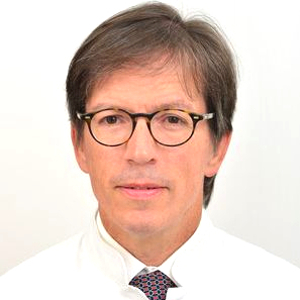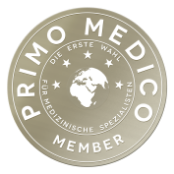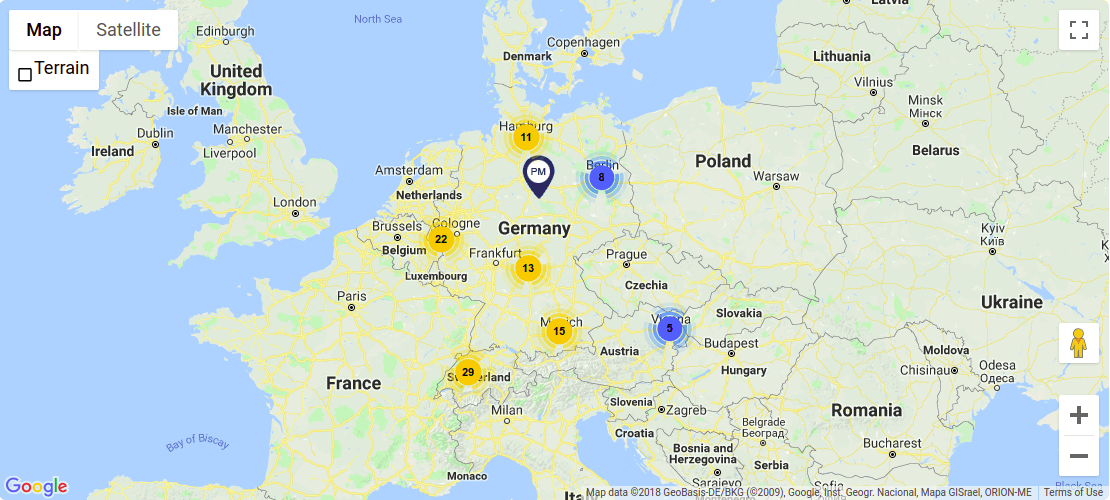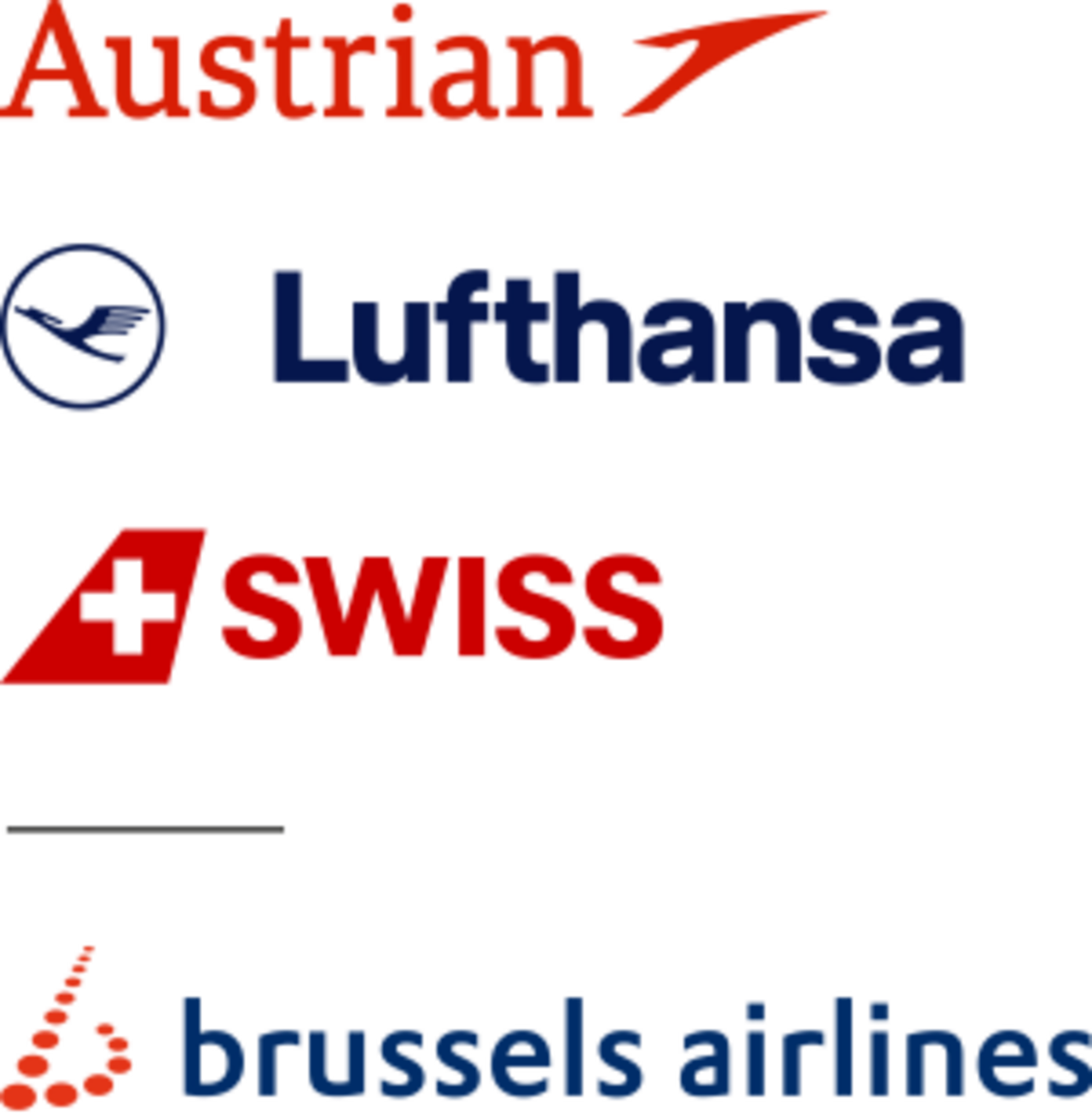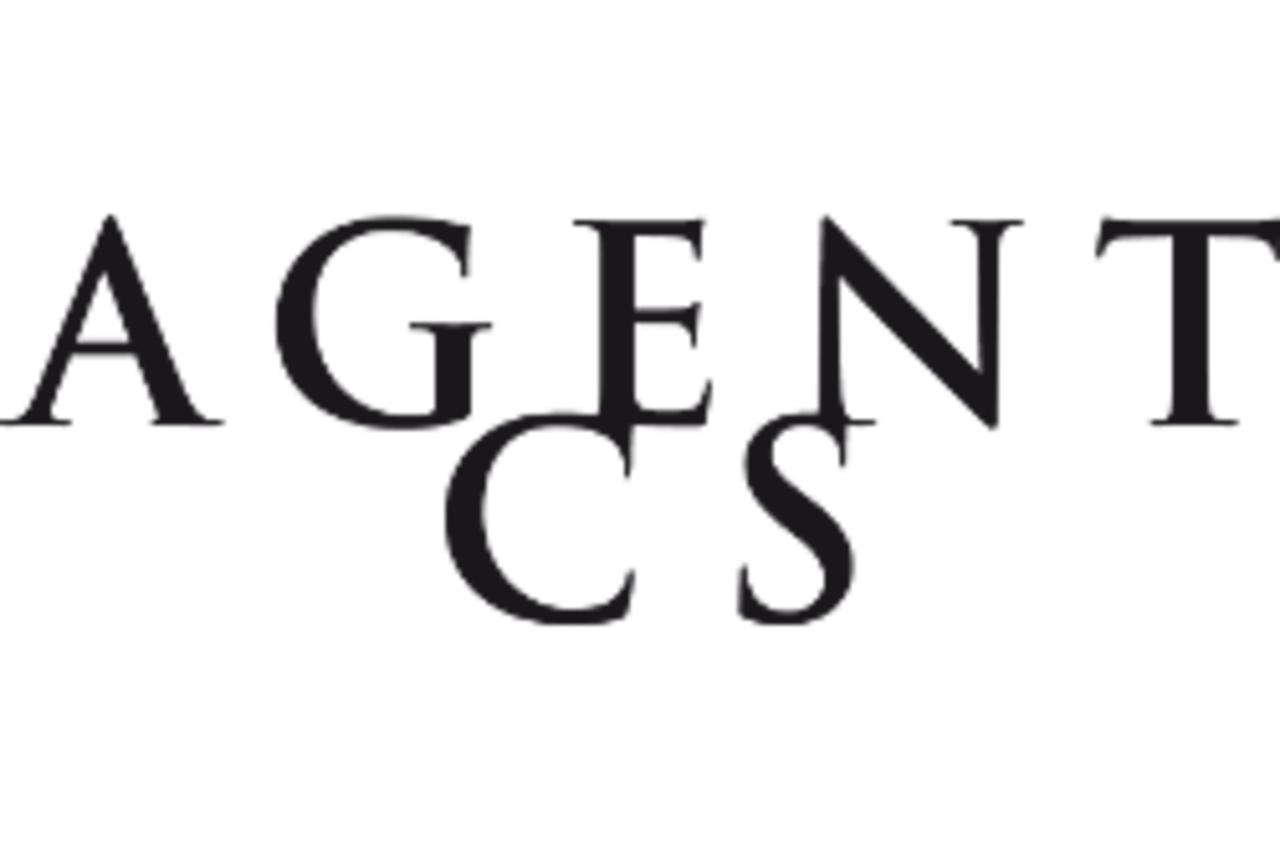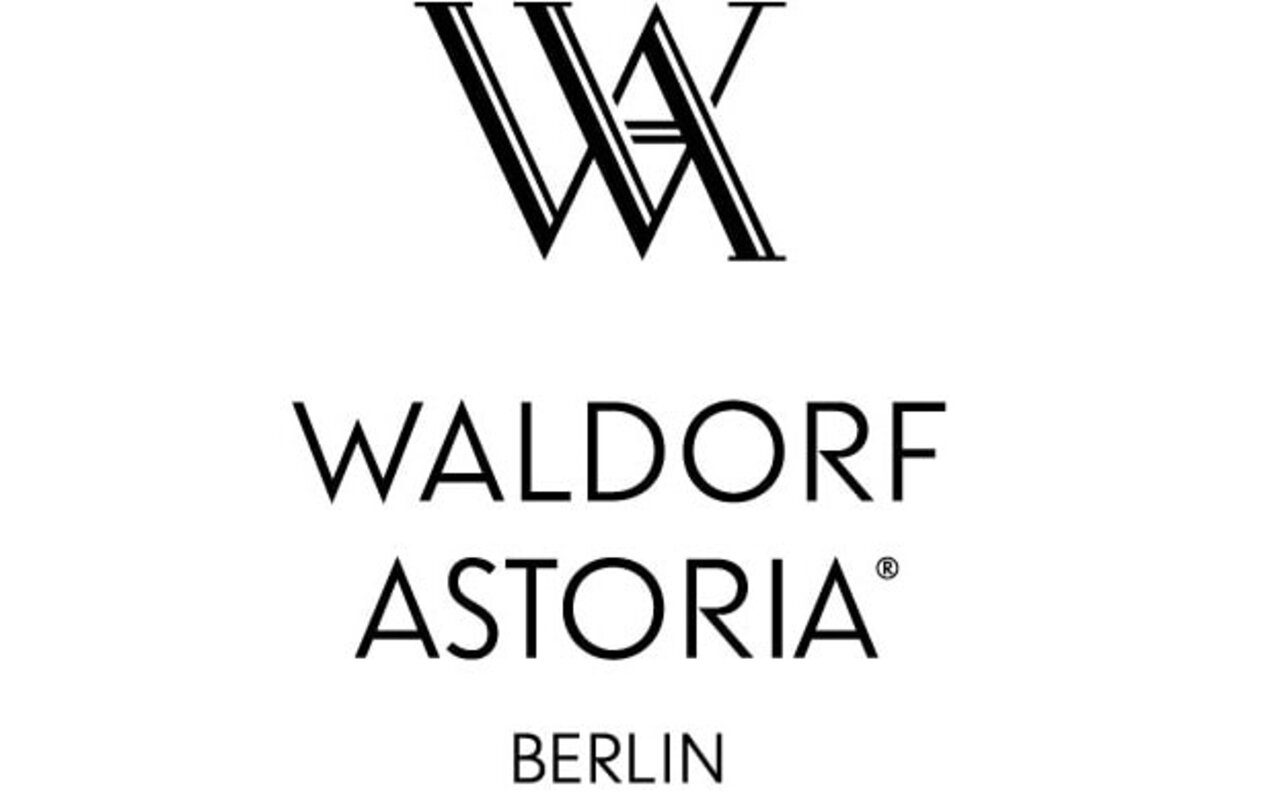Thoracic Surgery Berlin: Prof. Dr Rückert
Treatment focus
- Benign diseases of the lung (pneumothorax, empyema)
- Malignant diseases of the lung (lung carcinoma, lung metastases)
- Diseases of the mediastinum (myasthenia gravis, thymoma)
- Diseases of the pleura (mesothelioma, malignant pleural effusion)
- Thoracic deformities (funnel chest)
Contact
Charité University Medicine Berlin
Department of Surgery | CCM | CVK - Thoracic Surgery
Charitéplatz 1, D-10117 Berlin
P: +49 30 264 753 70 F: +49 30 450 552 900
Consultation Hours:
Lung & Chest Consultation Hours
Monday from 8:30 AM - 3:30 PM

Medical Range
Range of Diagnostic Services
- Bronchoscopy
- Mediastinoscopy
- Pleural puncture
Range of Therapeutic Services
- Abscesses of the chest, lungs, and mediastinum
- Bronchiectasis
- Bronchogenic cysts
- Chest tumors (e.g., sarcomas)
- Hemothorax
- Hyperhidrosis
- Pigeon chest
- Pulmonary emphysema
- Lung carcinoma
- Lung metastases
- Pulmonary nodule
- Mediastinal tumors
- Metastases
- Mesothelioma
- Myasthenia gravis
- Pericardial cysts
- Fungal diseases of the lung
- Pneumothorax
- Pleural effusion
- Pleural carcinomatosis
- Pleural empyema
- Pleural mesothelioma
- Round focus
- Sarcomas of the lung and thoracic wall
- Thymoma
- Tracheal stenosis
- Tracheomalacia
- Funnel chest
- Tuberculosis
- Soft tissue tumors
- Diaphragmatic paresis
More Information
Card
Prof. Dr Jens-Carsten Rückert is a specialist in thoracic surgery and the Head of Thoracic Surgery at the Surgical Klinik Campus Charité Mitte (CCM) and Campus Virchow-Klinikum (CVK) and Representative Head of the Charité Lung Cancer Center Berlin.
Prof. Rückert and his team focus on the complex therapy of lung cancer and lung metastases, which are carried out using modern minimally invasive surgery or robot-assisted techniques. The focus is always on the patient, with respect for their individuality.
State-of-the-Art Robot-Assisted Treatments for Diseases in the Lung and Chest Area
Robotic surgery is still one of the most modern surgical procedures. Many years of experience using the surgical robot are highly relevant to successfully implementing robot-assisted surgery.
The Charité in Berlin has been one of the most experienced centers in robotic surgery for over twenty years. Prof. Dr Rückert has carried out numerous complex robot-assisted procedures in the thoracic surgery department of the hospital since 2003 and thus contributes a considerable level of experience in the surgical treatment of diseases of the lung and mediastinum.
The three-dimensional image reproduction and the freedom of movement of the instruments during the surgeries represent only two of the many advantages of the robot-assisted procedure. An experienced surgeon always controls the robot; autonomous movements are impossible.
The minimally invasive procedure also speeds recovery due to less soft tissue damage and less intense pain. In this way, patients can usually be mobilized considerably earlier than with open surgery.
Specialist for Lung Cancer: Surgery for Malignant Tumors of the Lung
Lung cancer represents one of the most common malignancy-related causes of death worldwide and requires treatment by an experienced medical team. The treatment of malignant lung tumors is one of the particular fields of the thoracic surgery team led by Dr Rückert.
Great importance is attached to a multidisciplinary concept for implementing this treatment at the Charité. Various disciplines are involved, and interdisciplinary tumor conferences are held to create an optimal individual therapy concept for the patient.
After comprehensive diagnostics and tumor staging to determine the stage and spread of the tumor, the decision can be made to remove a section of the lung surgically. Depending on the stage and intraoperative picture, the extent of the surgery may vary and may be expanded during the procedure if necessary. These options are discussed in detail with the patients in advance.
Minimally invasive and open surgery are available. The patients can ask questions anytime during the treatment and the continuous pre- and post-treatment. A close exchange between patients, nursing staff, and the treating medical team is a top priority at the clinic.
Multidisciplinary Treatment Concept for Lung Metastases
Primary tumors of other organs often lead to tumor metastases in the lung. These lung metastases usually do not show any symptoms at first. They are typically noticed during staging examinations, in which a possible tumor spread in the body is to be detected.
After detailed diagnostics, the patient cases are discussed in an interdisciplinary tumor conference, and a decision is made on whether surgical therapy of the lung foci is possible. This depends to a large extent on the number and location of metastases involved.
The patient's general condition is also highly relevant. If the decision favors surgical treatment, it can be done by open or minimally invasive surgery.
Gentle Da Vinci Surgery for Diseases of the Thymus
The thymus gland behind the breastbone is responsible for immune system tasks. In some cases, removal of the gland may be necessary, for example, when a benign or malignant tumor develops, or patients suffer from the autoimmune disease myasthenia gravis.
The thymus gland is essential to developing this autoimmune disease and is a crucial therapeutic component. The Charité is one of the certified myasthenia centers in Germany. Numerous total removals of the thymus gland are successfully accomplished. Whether the surgery is open or minimally invasive depends on the size of the thymus.
Minimally invasive thymectomy is carried out using a Da Vinci robot. Dr Rückert is one of the most experienced surgeons worldwide carrying out robot-assisted thymectomies in this field.
Mesothelioma of the Pleura: Individualized, Modern Treatment and Therapy Concepts
The pleura consists of a fragile membrane surrounding the lungs and a second layer that lines the inside of the chest wall. In very rare cases, malignant degeneration, called pleural mesothelioma, occurs in this area.
This tumor is closely associated with past asbestos exposure, so cancer is often recognized as an occupational disease. Due to the tumor's rarity, therapy is carried out in specialized centers like the Thoracic Surgery Department of the Charité Berlin.
In earlier stages, mesothelioma often remains asymptomatic, so the malignancy is often diagnosed late. The thoracic surgery team offers conservative and surgical treatment options depending on the tumor's severity and the patient's general condition. Conservative treatment options include chemotherapy, radiation therapy, and what is known as talc pleurodesis, in which the two pleural sheets are glued together to prevent further fluid accumulation.
Physicians surgically carry out tumor removal or the HITOC procedure. Surgeons use a warm chemotherapy solution to flush the chest in this procedure. This serves to kill potential tumor cells. To date, only a few facilities offer this form of therapy. It is discussed in detail with the patient which procedure comes into consideration.
Funnel Chest Surgery in Berlin: Many Years of Experience with Thoracic Deformity
The funnel chest is often congenital and associated with an inward retraction of the sternum. The exact cause of the disease is still unclear. In very pronounced forms, respiratory and cardiac activity may be restricted during sports activities.
In addition, there is usually a psychosocial and esthetic burden that should not be underestimated, and which should also be included in the decision to operate. Beforehand, a detailed diagnosis is made to assess the existing problems.
The physicians of the thoracic surgery department at the Charité in Berlin discuss the surgical options individually with the patients and their relatives so that a therapy concept can be developed together.
Surgical correction is done with the help of insertable metal rods, which correct the deformity of the chest. Nowadays, the surgery is usually minimally invasive using the Nuss correction method, ideally after length growth has been completed in adolescence. In very pronounced cases, open surgery may also be used.
Please visit the website of the Surgical Department for further information.
Team
- Univ-Prof. Dr Johann Pratschke
Director Surgical Department - Prof. Dr Jens Neudecker
Senior Physician - Focus Thoracic Surgery
Transport Connections
| Berlin Main Station | 1.8 km |
| Berlin Airport | 30 km |
Information about Berlin
The German state capital of the federal state with the same name is located in the east of the Federal Republic of Germany. Berlin is the largest city in the country and the seat of government since 1999. The rivers Spree, Havel and smaller rivers and streams flow through the city. Furthermore, the cityscape is characterised by lakes, forests and parks, making Berlin one of the greenest capitals. The Berlin Mitte district is located in the centre of the 12 districts into which the city is divided.

